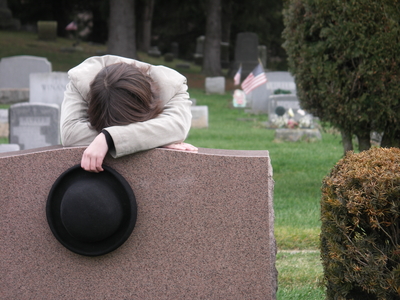Grief
 I know people personally who have gone through the depths of grief. It is a dark valley and the road is paved with despair. It is so hard to see out of the valley. I’m so thankful that the Lord can come along side and direct the grieving out of that dark, dreary valley.
I know people personally who have gone through the depths of grief. It is a dark valley and the road is paved with despair. It is so hard to see out of the valley. I’m so thankful that the Lord can come along side and direct the grieving out of that dark, dreary valley.
Ephraim, the son of Joseph when through this dark valley of grief. Check this out…
Ezer and Elead were killed by the native-born men of Gath, when they went down to seize their livestock. 22 Their father Ephraim mourned for them many days, and his relatives came to comfort him. 23 Then he made love to his wife again, and she became pregnant and gave birth to a son. He named him Beriah, because there had been misfortune in his family. (1 Chronicles 7:21b-23 NIV)
The part of this passage that jumped in my lap this morning was the fact that Ephraim mourned for his sons many days. My heart aches for parents who have lost a child in death.
Elizabeth Kubler-Ross introduced five stages of grief many years ago and I believe they are pretty significant and accurate to those who have faced the sudden death of a child, a parent, a friend or a spouse.
- Denial — The first reaction is denial. In this stage individuals believe the diagnosis is somehow mistaken, and cling to a false, preferable reality.
- Anger — When the individual recognizes that denial cannot continue, they become frustrated, especially at proximate individuals. Certain psychological responses of a person undergoing this phase would be: “Why me? It’s not fair!”; “How can this happen to me?”; ‘”Who is to blame?”; “Why would this happen?”.
- Bargaining — The third stage involves the hope that the individual can avoid a cause of grief. Usually, the negotiation for an extended life is made in exchange for a reformed lifestyle. People facing less serious trauma can bargain or seek compromise.
- Depression — “I’m so sad, why bother with anything?”; “I’m going to die soon, so what’s the point?”; “I miss my loved one, why go on?”
- During the fourth stage, the individual despairs at the recognition of their mortality. In this state, the individual may become silent, refuse visitors and spend much of the time mournful and sullen.
- Acceptance — “It’s going to be okay.”; “I can’t fight it, I may as well prepare for it.”
In this last stage, individuals embrace mortality or inevitable future, or that of a loved one, or other tragic event. People dying may precede the survivors in this state, which typically comes with a calm, retrospective view for the individual, and a stable condition of emotions. (“On Death & Dying” 2011 Elizabeth Kubler-Ross) I also have heard from numerous people that Granger Westburg’s book “Good Grief” is an excellent, short but honest and with the heart of a pastor.
I’m thankful that our church (Southern Hills Christian Church) is offering a restoration group/class called GriefShare starting in August. This group will be led by two very dear friends who have been through this valley of grief in the loss of a child. I think the sign up is going on now at www.sohillscc.com.
I haven’t grieved the death of a child, parent, spouse or close personal friend. I do remember the grief of divorce many years ago and the process of grief is similar. There are things in this life that are very certain and death is one of them. I’m not going to predict how I will handle death that is up close and personal, but I fully intend to walk with the Giver of Life through the valley of death. He never leaves me alone.
Pressing On!
Dwayne